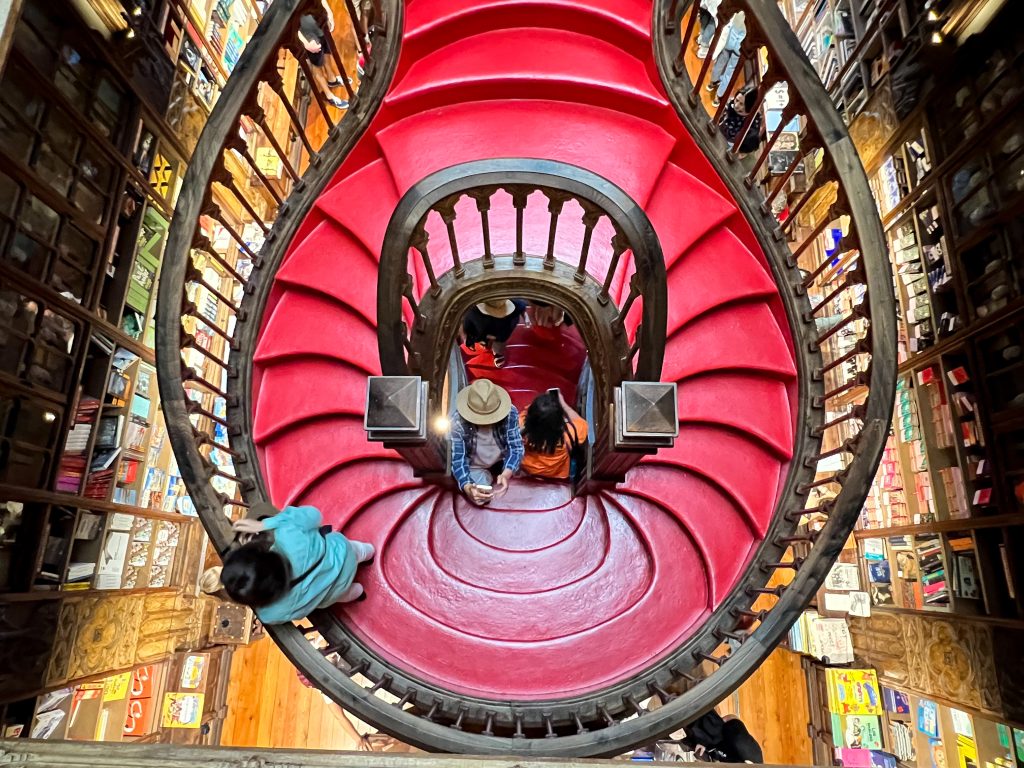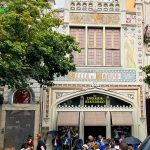
I gave the Lello & Irmão Bookstore in Porto, Portugal, credit for being humble because somewhere on the internet, (Lonely Planet) it was billed as the third-most-beautiful bookstore in the world.
Indeed, it is beautiful.
Books are shelved alongside stately columns, above inlaid wood flooring, and below stained glass.
 What may be the book industry’s most-talked-about spiraling staircase will take readers to a second floor equally ornate with its carvings, patterns, and lamps.
What may be the book industry’s most-talked-about spiraling staircase will take readers to a second floor equally ornate with its carvings, patterns, and lamps.
Not being ranked No.1, the bookstore known as Lello earned a little higher stature in my mind — a brightly attractive place that may not have the sovereign crown of beauty under its full control, but still donning a creative edge to compete.
If something claims to be the third-most-beautiful anything, detractors have a more difficult time knocking the boaster out of position.
If, however, a landmark claims to be the most beautiful in the world, then naysayers will promptly throw stones to knock the place off its pedestal.
Curious about the competitors in this beauty pageant, I picked up some stones and went looking for the store credited to be the No. 1 most beautiful bookstore in the world. I learned the crown is up for grabs.
This was not an easy task because beauty is subject to the source of perception.
Foursquare and Flavorwire will order Lello number four in their descriptions. The British Broadcasting Corporation puts the Porto attraction at fifth in line. In third place among bookstores deemed “fairest of the fair,” the UK Guardian ranks Livraria Lello in historical Porto as number three.
I first discovered this bookstore in Atlas Obscura, the book and website travel advisory, which said the 116-year-old business was “consistently named one of the most beautiful bookstores in the world.”
We resolved to see it in person, en route to our Portuguese coastal trek along the Camino de Santiago.
We set the store as a destination, only to learn that the bookstore’s fame has led to a ticketing system.
“It’s a bookstore,” I thought. “We should just be able to walk in and buy some books.”
But no, its website warned that for 8 o’clock on a Friday morning, there were only 35 tickets left.
Tickets were parsed out in appointments every half-hour. Cost? Five euros per person. If only 35 spots were available at the opening bell, how many people would be allowed to enter each half hour?
 Still eager for the spectacle, we bought tickets for a 5 p.m. encounter. We walked to the head of the line, bypassing people who had no tickets and were stuck outside staring at the store’s art nouveau façade. If enough ticketed customers would exit, they might be granted the privilege of buying a book despite their poor planning.
Still eager for the spectacle, we bought tickets for a 5 p.m. encounter. We walked to the head of the line, bypassing people who had no tickets and were stuck outside staring at the store’s art nouveau façade. If enough ticketed customers would exit, they might be granted the privilege of buying a book despite their poor planning.
 Narrow and deep, the two-story bookhouse made an immediate, vibrant impression on me. Its colors invited me to take pictures. I did. Lots.
Narrow and deep, the two-story bookhouse made an immediate, vibrant impression on me. Its colors invited me to take pictures. I did. Lots.
That’s when it dawned on me that the famed Livraria Lello had seemingly lost its soul. Customers were gawkers not readers. They paid their five euros to admire the stained glass and to climb the staircase. Instead of fingering the pages of books, their fingers focused their cameras and snapped shutters.
And I can’t blame the Lello bookstore for capitalizing on its own beauty. If it were not beautiful, it would not be selling tickets, and it would not be in business because selling books alone is a difficult trade. Books alone may not pay the rent.
I reminded myself the true beauty of a bookstore is its content and its nurture of stories, like my humble, local go-to: Ruby’s Books in Folsom, California.
 Here in Portugal, it saddened me that the first table of books I saw contained Lello-published souvenir editions of copyright-free classics, miniature, gilded books in Portuguese that a buyer would be unlikely to ever read — a mere take-home trinket to say, “I’ve been there.”
Here in Portugal, it saddened me that the first table of books I saw contained Lello-published souvenir editions of copyright-free classics, miniature, gilded books in Portuguese that a buyer would be unlikely to ever read — a mere take-home trinket to say, “I’ve been there.”
For the store’s defense, I credit their attempt to link great authors to readership through the bookstore’s partnership with Time magazine. Not only did they promote 20th and 21st century Nobel prize winners, but also authors who “could have” or “should have” received a book award.
Young booksellers were attentive. I asked a friendly and helpful Lello staff member about the Ukrainian translation of The Little Prince by Antoine de Saint-Exupery. “Sorry, sold out,” he said in English.
Books in English were relegated to a corner of the store. Given the number of international visitors, the books in German, Spanish, and English were few, so in the end, I left without a book. Just digital pictures. I was guilty of mere gawking.
In earlier times, Lello was a quieter book-only establishment. It’s reported that in the 1990s an English teacher would sip coffee on the second floor and take inspiration from the library-like surroundings. That Porto teacher was J.K. Rowling, and her imagination led to Harry Potter.
My final disappointment was that this livraria is now a difficult store from which local Porto readers can find a book. After all, they have to bump elbows with tourist traffic; stand, not sit; and rush pass the shelves. It is much easier for them to go down the street to the Bertrand bookstore for an experience centered on stories, not tickets.
Alas, Lello’s is now a tourist attraction — a busy, colorful carousal worshipping the shelves for bundled paper, where words are less important than photographs. Well, at least the theme is books. That’s something.
Post Script: Now that I’m a ticket holder, I’m also privileged to receive newsletters from the famous Livraria Lello. But in the invitation to get the newsletter, the establishment called itself the “world’s most beautiful bookstore.” So much for humility.
Excellent